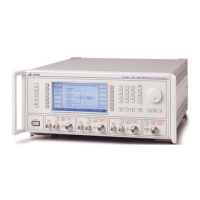46882/439 3-45
Memory
Memory stores
There are three types of store: carrier, full and RAM. Both carrier and full stores are non-volatile.
The contents of the RAM store are lost when the instrument is switched off.
Each type of store holds the data for all fitted sources.
Carrier store
The non-volatile carrier frequency store has 100 locations numbered 0 to 99 for the storage of
carrier frequency only. This store can be used to apply a set of test conditions to a range of
frequencies. For example, if you wish to use the same modulation at a variety of frequencies you
can use the carrier store to set the instrument to each of the frequencies in turn. When a carrier
store is used it will only replace the current carrier frequency − all the other settings will remain
unchanged.
Full store
The non-volatile full store has 100 locations numbered 0 to 99 for the storage of instrument
settings. This store is used to store those parameters which currently affect the RF output; carrier
frequency, RF level, modulations in use, on/off and source information and the two modulation
oscillator frequencies in use.
A full store contains the following information:
Carrier frequency setting
Carrier frequency step size
RF level setting
RF level step size
All modulation settings
All modulation step sizes
Modulation mode and status
The active modulation frequencies
The modulation frequency step size
All sweep settings
RAM store
The volatile RAM store has locations numbered from 0 to 99 for the full storage of instrument
settings. The parameters stored are the same as those for the full store. However, the RAM store
has no long-term wear-out mechanism and is therefore recommended for use in ATE programs
where all the settings to be used in a test sequence are initially declared and then recalled. This
results in a reduction of the GPIB/RS-232 overhead.

